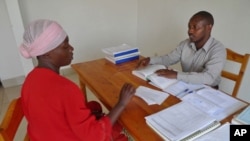It has been more than 16 years since the 1994 genocide in Rwanda left 800,000 dead, and forced hundreds of thousands of people to flee the country. Since then, Rwandans have been returning to their homeland, but some have found their land occupied by others, resulting in court cases about land and other disputes. .
The Rwanda Legal Aid Project is a four-year initiative managed by the group Lawyers without Borders (Avocats sans Frontieres). Funded by the United States Agency for International Development the project is designed to give free legal advice from professional Rwandan lawyers to vulnerable Rwandans, meaning mostly people who are poor, orphans, and those with HIV or AIDS.
Lawyer Pascal Dusengeyeru gives legal advice to his client, Bernadine Nyiramugisha. They are sitting inside a room in the Gisenyi Legal Aid Clinic, located on a dirt road just a few minutes from the center of Gisenyi in northwest Rwanda, a city of about 350,000 people.
Nyiramugisha explains why she came to the center from her hometown of Rugerero, about an hour and a half away.
She says she lived with a man out of marriage and they had two children ... but after three years, the man left. She says he went to look for another woman and he married her. Now he will not recognize his children and he does not help her educate them. She came here to the legal aid center and they advised her to go to court so that the man would be ordered to help educate their children. "I went to court for the first time and I won," she says
The alleged father appealed to a higher court and Nyiramugisha's victory was overturned. So she is back at the legal center working with her lawyer Pascal Dusengeyeru to prepare her own appeal. /// END OPT ///
Dusengeyeru is one of more than 50 lawyers who works with Lawyers without Borders. Having worked for the legal aid center for about five months, he has helped about 30 Rwandans, mostly with paternity cases and land disputes.
The Internal Displacement Monitoring Center reports that land disputes are about 80 percent of the cases presented before provincial courts. Family members may claim they have been allocated an unfair share of an inherited piece of land. Making the problem worse, there are often no official documents to backup claims.
Despite the challenges, Dusengeyeru said he has been successful in helping his clients.
When the people come to us, he says, they are in trouble, but after providing them legal advice, they feel confident, they feel better. He says when he was on his way home the other day, he met three people and they told him 'thanks' for his help.
Dusengeyeru said he too is happy in helping vulnerable populations.
The United Nations reports about two-out-of-three Rwandans can read and write, and Dusengeyeru said only three of his clients attended secondary school.
He says those people are from the villages and they do not know anything about their legal rights. So we help them, he adds.
Like most of Dusengeyeru's clients, Nyiramugisha just went to primary school. The 33-year-old Rwandan said she is confident about her lawyer's competency and she is grateful for the free legal advice.
She sees this legal aid office as very beneficial, but she thinks they have to look for more funds so they can come and have similar legal aid offices in the villages. Because she says many of her neighbors lost their rights because they do not have a background in law.
Mary Louise Mukasuma manages the Lawyers Without Borders legal aid project. She said it is important for people to get legal advice.
"Access to justice is one of the indications of development. A country cannot develop without access to justice with the people. That is why the government now is implementing Access to Justice bureaus countrywide," she said.
But the Ministry of Justice only has 13 legal aid bureaus setup. Outside of a few other university run legal centers, Lawyers without Borders' Gisenyi Legal Aid Clinic is one of the few non-governmental places to provide free advice on the law.
The center is open two days a week. On the other days, the Legal Aid Project sends its lawyers to three prisons around the country where they provide legal aid to prisoners and detainees.
In Rwanda, about 60 percent of the population lives below the poverty line. About 42 percent of the population live in what the United Nations calls "absolute poverty." So, Lawyers Without Borders also has a mobile legal advice service, going to rural areas because transport costs can prevent Rwandans from receiving help.
Mukasuma said the Rwandans receiving the legal services are happy to be educated about their rights, especially if they have to go to court. "Because you know many people, they are afraid of judges sometimes. When he sees a judge there, he is sometimes afraid. But when he come here, after he feels confident. He says now I know my rights. I know how to plead in court," she said.
Mukasuma said she hopes that when the Lawyers Without Borders legal aid project comes to an end in two years, the government-funded Access to Justice bureaus will be able and ready to cater to all Rwandans in need of legal advice.
Rwandans Receive Free Legal Aid
- By Zack Baddorf




